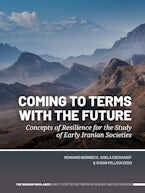The papers in this collection are the product of the conference "Hittites, Greeks and Their Neighbors in Ancient Anatolia: An International Conference on Cross-Cultural Interaction," hosted by Emory University in Atlanta, Georgia. They cover an impressive range of issues relating to the complex cultural interactions that took place on Anatolian soil over the course of two millennia, in the process highlighting the difficulties inherent in studying societies that are multi-cultural in their make-up and outlook, as well as the role that cultural identity played in shaping those interactions. Topics include possible sources of tension along the Mycenaean-Anatolian interface; the transmission of mythological and religious elements between cultures; the change across time and space in literary motifs as they are adapted to new milieus and new audiences; the ways in which linguistic data can refine our understanding of the interrelations between the various peoples who lived in Anatolia; and the role that the Anatolian kingdoms of the first millennium played as cultural filters and conduits through which North Syrian or Near Eastern ideas or materials were transmitted to the Greeks.
Introduction
Part 1: History, Archaeology and the Mycenaean-Anatolian Interface
Troy as a "Contested Periphery": Archaeological Perspectives on Cross-Cultural and Cross-Disciplinary Interactions Concerning Bronze Age Anatolia (Eric Cline)
Purple-Dyers in Lazpa (Itamar Singer)
Multiculturalism in the Mycenaean World (Stavroula Nikoloudis)
Hittite Lesbos? (Hugh Mason)
Part 2: Sacred Interactions
The Seer Mopsos as a Historical Figure (Norbert Oettinger)
Setting up the Goddess of the Night Separately (Jared Miller)
The Songs of the Zintuhis: Chorus and Ritual in Anatolia and Greece (Ian Rutherford)
Part 3: Identity and Literary Traditions
Homer at the Interface (Trevor Bryce)
The Poet's Point of View and the Prehistory of the Iliad (Mary Bachvarova)
Hittite Ethnicity? Constructions of Identity in Hittite Literature (Amir Gilan)
Part 4: Identity and Language Change
Writing Systems and Identity (Annick Payne)
Luwian Migration in Light of Linguistic Contacts (Ilya Yakubovitch)
"Hermit Crabs," or New Wine in Old Bottles: Anatolian-Hellenic Connections from Homer and Before to Antiochus I of Commagene and After (Calvert Watkins)
Possessive Constructions in Anatolian, Hurrian and Urartean as Evidence for Language Contact (Silvia Luraghi)
Greek mólybdos as a Loanword from Lydian (H Craig Melchert)
Part 5: Anatolia as Intermediary: The First Millennium
Kybele as Kubaba in a Lydo-Phrygian Context (Mark Munn)
King Midas in Southeastern Anatolia (Maya Vassileva)
The GALA and the Gallos (Patrick Taylor)
Patterns of Elite Interaction: Animal-Headed Vessels in Anatolia in the Eighth and Seventh Centuries BC (Susanne Ebbinghaus)
"A Feast of Music": The Greco-Lydian Musical Movement on the Assyrian Periphery (John Franklin)
General Index











